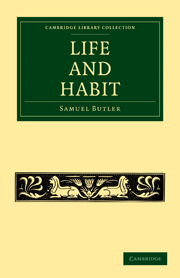Book contents
- Frontmatter
- PREFACE
- Contents
- CHAP. I ON CERTAIN ACQUIRED HABITS
- CHAP. II CONSCIOUS AND UNCONSCIOUS KNOWERS—THE LAW AND GRACE
- CHAP. III APPLICATION OF FOREGOING CHAPTERS TO CERTAIN HABITS ACQUIRED AFTER BIRTH WHICH ARE COMMONLY CONSIDERED INSTINCTIVE
- CHAP. IV APPLICATION OF THE FOREGOING PRINCIPLES TO ACTIONS AND HABITS ACQUIRED BEFORE BIRTH
- CHAP. V PERSONAL IDENTITY
- CHAP. VI PERSONAL IDENTITY—(continued)
- CHAP. VII OUR SUBORDINATE PERSONALITIES
- CHAP. VIII APPLICATION OF THE FOREGOING CHAPTERS — THE ASSIMILATION OF OUTSIDE MATTER
- CHAP. IX ON THE ABEYANCE OF MEMORY
- CHAP. X WHAT WE SHOULD EXPECT TO FIND IF DIFFERENTIATIONS OF STRUCTURE AND INSTINCT ARE MAINLY DUE TO MEMORY
- CHAP. XI INSTINCT AS INHERITED MEMORY
- CHAP. XII INSTINCTS OF NEUTER INSECTS
- CHAP. XIII LAMARCK AND MR. DARWIN
- CHAP. XIV MR. MIVART AND MR. DARWIN
- CHAP. XV CONCLUDING REMARKS
CHAP. XI - INSTINCT AS INHERITED MEMORY
Published online by Cambridge University Press: 29 August 2010
- Frontmatter
- PREFACE
- Contents
- CHAP. I ON CERTAIN ACQUIRED HABITS
- CHAP. II CONSCIOUS AND UNCONSCIOUS KNOWERS—THE LAW AND GRACE
- CHAP. III APPLICATION OF FOREGOING CHAPTERS TO CERTAIN HABITS ACQUIRED AFTER BIRTH WHICH ARE COMMONLY CONSIDERED INSTINCTIVE
- CHAP. IV APPLICATION OF THE FOREGOING PRINCIPLES TO ACTIONS AND HABITS ACQUIRED BEFORE BIRTH
- CHAP. V PERSONAL IDENTITY
- CHAP. VI PERSONAL IDENTITY—(continued)
- CHAP. VII OUR SUBORDINATE PERSONALITIES
- CHAP. VIII APPLICATION OF THE FOREGOING CHAPTERS — THE ASSIMILATION OF OUTSIDE MATTER
- CHAP. IX ON THE ABEYANCE OF MEMORY
- CHAP. X WHAT WE SHOULD EXPECT TO FIND IF DIFFERENTIATIONS OF STRUCTURE AND INSTINCT ARE MAINLY DUE TO MEMORY
- CHAP. XI INSTINCT AS INHERITED MEMORY
- CHAP. XII INSTINCTS OF NEUTER INSECTS
- CHAP. XIII LAMARCK AND MR. DARWIN
- CHAP. XIV MR. MIVART AND MR. DARWIN
- CHAP. XV CONCLUDING REMARKS
Summary
I have already alluded to M. Ribot's work on “Heredity,” from which I will now take the following passages.
M. Ribot writes:—
“Instinct is innate, i.e., anterior to all individual experience.” This I deny on grounds already abundantly apparent; but let it pass. “Whereas intelligence is developed slowly by accumulated experience, instinct is perfect from the first” (“Heredity,” p. 14).
Obviously the memory of a habit or experience will not commonly be transmitted to offspring in that perfection which is called “instinct,” till the habit or experience has been repeated in several generations with more or less uniformity; for otherwise the impression made will not be strong enough to endure through the busy and difficult task of reproduction. This of course involves that the habit shall have attained, as it were, equilibrium with the creature's sense of its own needs, so that it shall have long seemed the best course possible, leaving upon the whole and under ordinary circumstances little further to be desired, and hence that it should have been little varied during many generations. We should expect that it would be transmitted in a more or less partial, varying, imperfect, and intelligent condition before equilibrium had been attained; it would, however, continually tend towards equilibrium, for reasons which will appear more fully later on. When this stage has been reached, as regards any habit, the creature will cease trying to improve; on which the repetition of the habit will become stable, and hence become capable of more unerring transmission—but at the same time improvement will cease; the habit will become fixed, and be perhaps transmitted at an earlier and earlier age, till it has reached that date of manifestation which shall be found most agreeable to the other habits of the creature.
- Type
- Chapter
- Information
- Life and Habit , pp. 198 - 219Publisher: Cambridge University PressPrint publication year: 2009First published in: 1878



